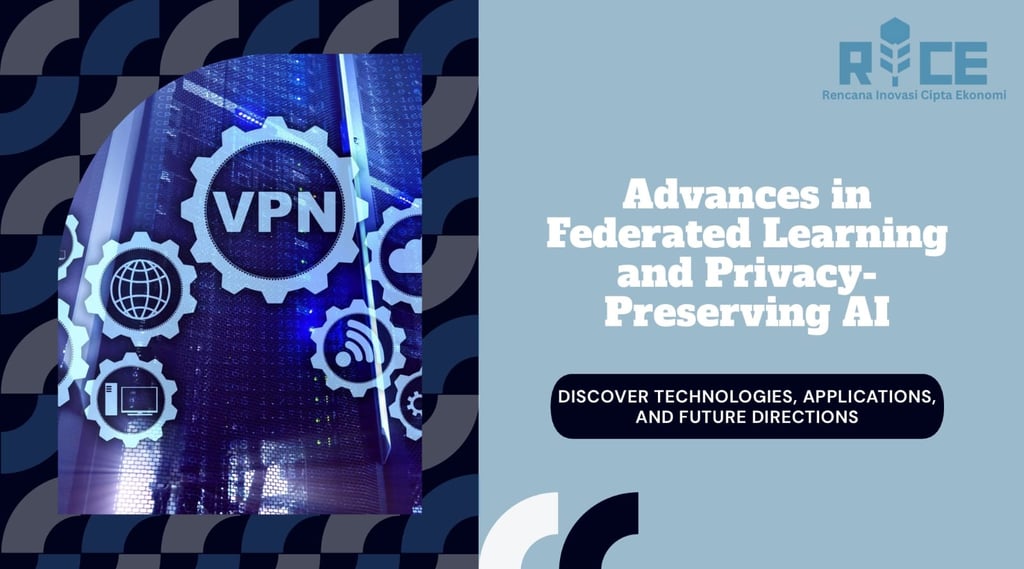Advances in Federated Learning and Privacy-Preserving AI: Technologies, Applications, and Future Directions
Blog poExplore how Federated Learning and Privacy-Preserving AI enable powerful, collaborative models without sharing raw data, balancing innovation with ethical safeguards.
INDUSTRIES
Rice AI (Ratna)
8/26/202511 min read


Introduction: The Imperative for Privacy in AI Systems
In the rapidly evolving landscape of artificial intelligence, the tension between data-hungry algorithms and growing privacy concerns has reached a critical juncture. The AI boom, particularly with large language models (LLMs) and their associated chatbots, has introduced unprecedented challenges for data privacy. As noted by Stanford HAI researchers, these systems pose risks that extend beyond traditional digital surveillance, including the repurposing of personal data without consent and the potential for sophisticated attacks like AI-enabled spear-phishing. In response to these challenges, privacy-preserving technologies have emerged as essential frameworks for developing powerful AI systems while maintaining robust privacy protections.
Among these approaches, federated learning (FL) has gained significant traction as a distributed machine learning process that allows multiple nodes to collaboratively train a shared model without exchanging raw data. This paradigm shift from moving data to models represents a fundamental reimagining of traditional machine learning workflows, offering advantages in data privacy, security, efficiency, and scalability by keeping data local and only exchanging model updates through communication networks. The implications extend beyond technical considerations to encompass ethical, regulatory, and practical dimensions that affect how organizations develop and deploy AI systems.
This article provides a comprehensive analysis of recent advances in federated learning and privacy-preserving AI, drawing on cutting-edge research and real-world implementations across various industries. By examining both the technical innovations and practical challenges, we aim to offer a balanced perspective on the current state and future trajectory of these critical technologies that stand at the intersection of AI advancement and privacy preservation.
Understanding Federated Learning: Principles and Evolution
Fundamental Concepts
Federated learning represents a decentralized approach to machine learning that fundamentally transforms traditional data-centric model training methodologies. Instead of collecting data in a central repository, FL brings the computational model to the source of data generation, such as mobile devices or edge servers, thereby eliminating the need for central data aggregation. This strategy significantly enhances data privacy and security while facilitating instantaneous updates and improvements to models by leveraging diverse data from user environments without transferring sensitive information from its origin.
The core architecture of FL involves a central server that coordinates multiple clients (devices or institutions) to collaboratively train a machine learning model. Each client computes an update to the model based on its local data, and only these updates (typically model parameters like weights or gradients) are shared with the server for aggregation. The server then combines these updates to improve the global model, which is subsequently redistributed to clients for further training or inference. This process maintains data locality, aligning with rigorous data protection standards like GDPR and HIPAA while still enabling the development of robust models.
Historical Development and Evolution
The concept of federated learning was formally introduced by McMahan et al. in their pioneering 2017 paper, "Communication-Efficient Learning of Deep Networks from Decentralized Data". This foundational research positioned FL as a response to growing concerns about data privacy and security in traditional machine learning frameworks, which relied on centralized data aggregation that amplified risks of breaches and misuse.
Since its introduction, FL has evolved to address various challenges, including data heterogeneity, system constraints, and privacy guarantees. Research has expanded to explore specialized techniques such as differential privacy, secure multi-party computation, and homomorphic encryption to further enhance the privacy properties of FL systems. The technology has also seen increasing standardization through frameworks like NVIDIA Federated Learning Application Runtime Environment (NVIDIA FLARE) and deployment in various industries, particularly healthcare and finance, where data sensitivity is paramount.
Technical Advances in Federated Learning Systems
Algorithmic Innovations and Efficiency Improvements
Recent research has addressed several technical challenges in federated learning, particularly concerning data heterogeneity, system efficiency, and model performance. Studies have revealed that while FL models generally perform well across client test sets, they do not always outperform all local models on their respective client test sets. This performance variability has spurred the development of more sophisticated aggregation algorithms and personalized FL approaches that balance global learning with local adaptation.
One significant advancement involves optimizing local client epochs to reduce experiment duration hampered by system and data heterogeneity. Researchers have found that carefully tuning the number of local iterations before aggregation can significantly improve convergence speed and final model performance, especially under non-IID (independently and identically distributed) data distributions across clients. Additionally, novel neural network architectures with attention mechanisms and ambiguity handling through uncertainty management have been developed specifically for FL environments.
Encryption and Security Breakthroughs
Perhaps the most significant encryption breakthrough in privacy-preserving AI is the development of fully homomorphic encryption (FHE) techniques that allow computation on encrypted data without decryption. Researchers have introduced Orion, a novel framework that brings FHE to deep learning—enabling AI models to practically and efficiently operate directly on encrypted data without needing to decrypt it first. This framework achieves a 2.38x speedup over existing state-of-the-art methods on ResNet-20 and enables computations on much larger networks than previously possible, demonstrating the first-ever high-resolution FHE object detection using YOLO-v1 with 139 million parameters.
On the security front, researchers have developed sophisticated defenses against poisoning attacks in FL systems. CrowdGuard offers a novel defense mechanism against backdoor attacks, ensuring the integrity of FL systems, while FreqFed introduces a frequency analysis-based approach for mitigating poisoning attacks. These security advancements are crucial for maintaining trust in FL systems, particularly in high-stakes applications where model integrity is paramount.
Privacy-Preserving AI Beyond Federated Learning
Complementary Privacy Technologies
While federated learning represents a significant advancement in privacy-preserving AI, it is most effective when combined with other privacy technologies. Differential privacy has emerged as a complementary technique that adds calibrated noise to model updates or outputs to prevent the reconstruction of individual data points. When integrated with FL, differential privacy provides a mathematical guarantee that model updates do not reveal too much about any individual data point in the local dataset.
Synthetic data generation is another approach gaining traction, where AI systems are trained on artificially generated datasets that preserve statistical properties of real data without containing actual private information. This approach is particularly valuable in scenarios where data must be shared between organizations for regulatory or collaborative purposes but where privacy concerns prevent sharing of raw data.
The Clio Framework: Privacy-Preserving Analytics
An innovative approach to privacy-preserving AI analytics is demonstrated by Clio (Claude insights and observations), a platform that uses AI assistants themselves to analyze and surface aggregated usage patterns across millions of conversations without human reviewers reading raw conversations. This approach validates that privacy-preserving analysis can be conducted with a high degree of accuracy while maintaining strict privacy protocols. Clio demonstrates how AI can provide valuable insights into real-world AI usage patterns—from coding, writing, and research tasks to language-specific patterns—while ensuring user privacy.
Real-World Applications and Case Studies
Healthcare: Transforming Medical Research Without Compromising Privacy
The healthcare sector has emerged as a prime beneficiary of federated learning technologies due to the sensitive nature of medical data and the tremendous value inherent in multi-institutional collaboration. Kakao Healthcare in South Korea has implemented a robust FL platform on Google Cloud that enables secure analysis of medical data from multiple hospitals, significantly improving data usability and prediction accuracy. Their system has achieved remarkable results, including predicting recurrence in breast cancer patients in four months instead of the two years typically required with conventional methods.
The platform facilitates collaboration among 16 universities for medical research while keeping personal data secure by storing and managing sensitive information within individual environments. Instead of sharing raw data, participating hospitals share machine learning results, enabling large-scale learning without data flowing out. The prediction performance for breast cancer recurrence dramatically improved through this approach, with the federated model achieving an accuracy of 0.8482 compared to the variable performance of individual hospitals (0.6397 to 0.8362).
Edge Computing and Consumer Applications
In the consumer technology space, Apple has implemented private federated learning (PFL) for training models on users' private data directly on edge devices. Their framework ensures that user data remains on individual devices, with only essential model updates transmitted to a central server for aggregation with privacy guarantees. This approach has been applied to develop an app selection model that incorporates a neural network with attention mechanisms and ambiguity handling through uncertainty management. The results demonstrate PFL's potential to improve model accuracy by adapting to changes in user behavior over while strictly adhering to privacy standards.
Clinical Pathology: Navigating Practical Challenges
The implementation of FL in clinical settings reveals both the promise and practical challenges of this technology. A multinational study on computational pathology applied FL for digital immune phenotyping in metastatic melanoma, utilizing the NVIDIA FLARE framework across four separate networks from institutes in four countries. The study identified several key challenges: infrastructure design hindered by hospital and corporate network restrictions (necessitating an open port for the server), long experiment durations due to system and data heterogeneity, and the requirement for significant IT expertise and familiarity with FL frameworks.
These findings highlight that beyond algorithmic challenges, real-world FL implementation must address practical concerns around infrastructure, networking, and expertise availability. The researchers ultimately deployed the server on an Amazon Web Services infrastructure within a semi-public network to overcome firewall restrictions, pointing to the need for flexible infrastructure solutions in healthcare FL applications.
Policy, Ethical Considerations, and Implementation Challenges
Regulatory Approaches and Limitations
The policy landscape for privacy-preserving AI is still evolving, with current regulations often struggling to keep pace with technological advancements. As Stanford researcher Jennifer King notes, "These default rules and practices aren't etched in stone". There's growing recognition that approaches focusing solely on data minimization and purpose limitation—while valuable—may be insufficient for addressing the unique challenges posed by AI systems. Regulators face difficulties in determining whether companies have collected "too much" information, particularly when organizations like Amazon or Google can justify extensive data collection by pointing to their diverse range of services.
King and colleagues propose a supply chain approach to data privacy that addresses both the input side (training data) and output side (model outputs) of AI systems. This perspective recognizes that privacy risks emerge not just from initial data collection but throughout the entire AI lifecycle, requiring comprehensive oversight rather than point solutions.
Ethical Imperatives and Collective Solutions
The ethical implications of AI privacy extend beyond individual rights to encompass collective impacts, particularly on vulnerable populations. There have been instances where AI systems used for candidate screening exhibited bias, such as Amazon's hiring tool that discriminated against female applicants. Similarly, facial recognition technologies have led to false arrests of Black men due to biased training data. These examples underscore how privacy violations in AI systems can exacerbate existing inequalities and lead to significant social harm.
As King observes, "Doubling down on individual rights isn't sufficient" to address these challenges. Instead, she proposes collective solutions such as data intermediaries—delegating negotiating power over data rights to collectives that can represent consumer interests at scale. These intermediaries could take various forms, including data stewards, trusts, cooperatives, collaboratives, or commons, providing consumers with greater leverage against powerful technology companies.
Implementation Challenges and Limitations
Despite its promise, federated learning faces several significant implementation challenges. Data heterogeneity across devices or institutions can adversely affect model performance and convergence, necessitating specialized aggregation techniques. Resource constraints on participant devices require careful balancing of computational and communication costs without compromising model training or accuracy. Additionally, while FL enhances privacy by keeping data local, the risk of information leakage through model updates remains a concern, requiring supplementary techniques like differential privacy and secure multi-party computation.
A practical study of FL implementation identified several specific challenges: the FL model performed best across all clients' test sets but did not outperform all local models on their own test sets; long experiment duration due to system and data heterogeneity; infrastructure design hindered by hospital and corporate network restrictions; and the need for significant IT expertise and familiarity with FL frameworks. These findings emphasize that successful FL deployment requires addressing both technical and practical implementation barriers.
Future Directions and Emerging Opportunities
Technological Innovations on the Horizon
The future of federated learning and privacy-preserving AI will likely be shaped by several technological trends. Automation frameworks like Orion that simplify the conversion of standard deep learning models into efficient privacy-preserving programs will lower barriers to adoption. As Austin Ebel, one of Orion's creators, notes, "There has been an incredible barrier to entry for people who don't want to spend months to years learning the ins and outs. With Orion, that barrier to entry is now almost non-existent".
Advances in hardware acceleration for cryptographic operations will make privacy-preserving techniques more computationally feasible, while innovations in algorithmic approaches will address current limitations around data heterogeneity and personalization. We can also expect greater integration between different privacy technologies, such as combining federated learning with fully homomorphic encryption to provide multiple layers of protection.
Expanding Application Domains
While healthcare has been an early adopter of federated learning, numerous other domains stand to benefit from these technologies. Financial services can use FL to detect money laundering patterns across institutions without sharing sensitive customer data. Manufacturing companies could collaborate on predictive maintenance models without exposing proprietary operational information. Smart cities might leverage FL to improve urban services based on data from multiple municipalities while maintaining citizen privacy.
Kakao Healthcare's future plans hint at this expanding applicability, with projects underway to interpret signs for colon cancer and explore drug development through federated collaboration. As Hwang notes, "Federated Learning has the potential to support further by not only conducting research on the effectiveness of existing drugs but also through its capability to extensively verify the results of final-stage clinical trials through participating hospitals".
Policy and Governance Evolution
As privacy-preserving AI technologies mature, we can expect increased regulatory attention and governance frameworks specifically addressing these approaches. Rather than treating FL and related technologies as mere implementation details, regulators may begin to recognize them as approved methods for achieving compliance with privacy regulations. This recognition could come through standardized certifications for privacy-preserving AI systems or safe harbor provisions that reduce liability for organizations using these techniques.
The development of industry-specific guidelines for implementing privacy-preserving AI will also be crucial, particularly in highly regulated sectors like healthcare and finance. The call for "greater transparency in future research and the development of best practices and guidelines for implementing FL in real-world healthcare settings" will likely extend to other domains as these technologies see broader adoption.
Conclusion: Balancing Innovation and Privacy Protection
Federated learning and privacy-preserving AI represent some of the most promising approaches to reconciling the tension between data-driven innovation and individual privacy rights. These technologies enable organizations to develop powerful AI systems while maintaining compliance with evolving regulations and ethical standards. As the case studies in healthcare demonstrate, the benefits extend beyond compliance to include improved model performance through access to more diverse datasets that would otherwise be unavailable due to privacy concerns.
However, implementing these technologies in real-world settings reveals significant challenges that go beyond algorithmic considerations. Infrastructure constraints, network restrictions, technical expertise requirements, and practical workflow issues must all be addressed for successful deployment. Furthermore, as Stanford researchers emphasize, technological solutions alone are insufficient without accompanying policy measures and collective approaches to data rights management.
The future of privacy-preserving AI will likely involve a layered approach that combines federated learning with other techniques like differential privacy, homomorphic encryption, and synthetic data generation. Frameworks like Orion that lower the barrier to implementing these complex technologies will be crucial for widespread adoption. As these technologies mature and become more accessible, we can expect to see broader implementation across industries and more sophisticated approaches to preserving privacy while unlocking the value of distributed data.
In conclusion, federated learning and privacy-preserving AI technologies offer a path forward that respects individual privacy rights while enabling continued innovation. As these technologies evolve, they have the potential to redefine the relationship between data utilization and protection, creating a more sustainable foundation for AI development that balances organizational needs with individual rights and social values.
References
Tamkin, A., et al. "Clio: Privacy-Preserving Insights into Real-World AI Use." arXiv:2412.13678 (2024). https://arxiv.org/abs/2412.13678
"In-depth Review and Categorization of Federated Learning Strategies." ScienceDirect (2024). https://www.sciencedirect.com/science/article/pii/S2405844024141680
Alkaeed, M., Qayyum, A., & Qadir, J. "Privacy preservation in Artificial Intelligence and Extended Reality (AI-XR) metaverses: A survey." ScienceDirect (2024). https://www.sciencedirect.com/science/article/pii/S1084804524001668
Ji, A., et al. "Private Federated Learning In Real World Application – A Case Study." Apple Machine Learning Research (2025). https://machinelearning.apple.com/research/learning-real-world-application
King, J. & Meinhardt, C. "Privacy in an AI Era: How Do We Protect Our Personal Information." Stanford Institute for Human-Centered Artificial Intelligence (2024). https://hai.stanford.edu/news/privacy-ai-era-how-do-we-protect-our-personal-information
"Navigating real-world challenges: A case study on federated learning for computational pathology." ScienceDirect (2025). https://www.sciencedirect.com/science/article/pii/S2153353925000501
"Issues in federated learning: some experiments and preliminary results." Scientific Reports 14, Article number: 29881 (2024). https://www.nature.com/articles/s41598-024-81732-0
Ebel, A., Garimella, K., & Reagen, B. "Encryption breakthrough lays groundwork for privacy-preserving AI models." NYU Engineering News (2025). https://engineering.nyu.edu/news/encryption-breakthrough-lays-groundwork-privacy-preserving-ai-models
"Kakao Healthcare: Empowering medical research and development with hospital data collaboration." Google Cloud Customers (2024). https://cloud.google.com/customers/kakao-healthcare-federated-learning
Krauß, T. & Dmitrienko, A. "Advancements in Federated Learning Security: Our Research Presented at NDSS 2024." University of Würzburg (2024). https://se.informatik.uni-wuerzburg.de/en/secure-software-systems-group/news/single/news/advancements-in-federated-learning-security-our-research-presented-at-ndss-2024/
#FederatedLearning #PrivacyPreservingAI #ArtificialIntelligence #DataPrivacy #EthicalAI #MachineLearning #TechInnovation #AI #CyberSecurity #DigitalTransformation #DailyAIIndustry
RICE AI Consultant
To be the most trusted partner in digital transformation and AI innovation, helping organizations grow sustainably and create a better future.
Connect with us
Email: consultant@riceai.net
+62 822-2154-2090 (Marketing)
© 2025. All rights reserved.


+62 851-1748-1134 (Office)
IG: @riceai.consultant
